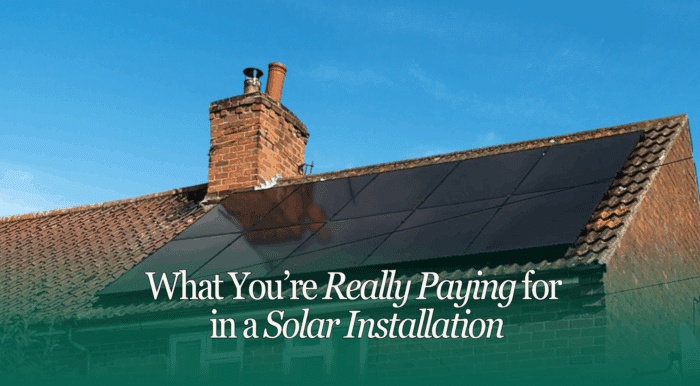If you’ve been comparing solar quotes recently, you’ve probably noticed one thing, prices can vary a lot.
Some companies advertise systems that seem “too good to be true,” while others come in higher, promising quality and long-term performance.
So, what’s the real difference?
What are you actually paying for when you invest in solar with a reputable installer?
Let’s break down where your money really goes, and why a well-designed, fully accredited installation always pays you back in the long run.

1. Design & System Planning
Before a single panel goes on your roof, a lot happens behind the scenes.
A quality installer doesn’t just look at your roof and throw panels at it, they:
- Carry out a site survey (either in person or via drone)
- Model your roof pitch, angle, shading and orientation
- Design a bespoke system using specialist software to maximise generation and return
- Match the right inverter and battery size to your household energy profile
This ensures your system isn’t just “on” your roof, it’s optimised for your roof.
A rushed or generic design might look fine at first glance, but it can lose thousands of kilowatt-hours (and pounds) in missed efficiency over the years.
At Novus Energy, every system is custom-designed for your home, not copied from the last customer’s quote.
2. Scaffolding and Safety
Scaffolding is one of the first costs many “cheap” quotes conveniently leave out, even though it’s required by law.
Proper access equipment ensures your installation team can:
- Work safely on your roof
- Handle panels and cabling without risk
- Leave no damage or broken tiles behind
For a typical two-storey home, scaffolding costs between £500–£800, depending on roof complexity.
It’s not just about safety, it’s about doing the job properly and protecting your property.
With Novus Energy, scaffolding is always included.
No hidden extras. No surprises later.
3. Quality Components
The panels and inverter are the beating heart of your solar system.
But not all hardware is created equal.
Here’s what defines premium equipment:
- High-efficiency panels (20%+ efficiency)
- Durable frame materials resistant to corrosion and UV damage
- Reliable inverters that manage power conversion seamlessly
- Compatible batteries with high depth-of-discharge and long cycle life
Investing in top-tier components means higher generation, fewer faults, and longer lifespan, protecting your ROI over decades.
When you choose a reputable installer, you’re paying for components that have been tried, tested and proven to perform in UK conditions.
4. DNO Approval & Compliance
Before your system can be connected to the National Grid, it must be approved by your Distribution Network Operator (DNO).
This process confirms that your system is safe, compliant, and won’t overload your local grid circuit.
A proper installer will:
- Submit your G98 or G99 application
- Handle all communication with the DNO
- Provide you with written approval and certification after installation
If your installer skips this step, your system technically isn’t legal, and you won’t be able to register for Smart Export Guarantee (SEG) payments.
With Novus Energy, DNO submission and registration are part of every install. It’s handled for you from start to finish.
5. Installation & Commissioning
This is where skilled engineers make all the planning worthwhile.
A professional team will:
- Fit the panels with precision and weatherproof mounting
- Run neat, hidden cabling, no messy conduit or drilling shortcuts
- Install the inverter and battery to manufacturer standards
- Test the full system for safe operation
- Set up your monitoring app and show you how to use it
You’re not just paying for labour, you’re paying for expert workmanship.
The difference between a neat, fully tested installation and a rushed job is huge, in performance, safety, and longevity.
6. Certification, Warranties & Insurance
Once installed, a quality company ensures every box is ticked for your peace of mind.
That includes:
- MCS certification (mandatory for SEG payments)
- Electrical test certificates (Part P compliance)
- Manufacturer product warranties (usually 10 years)
- Performance warranties on panels (up to 25 years)
- Insurance-backed workmanship warranty protecting you even if the company closes down
Cut-price installers often skip the insurance-backed part or fail to register your installation properly.
If something goes wrong later, that “cheap” quote can become very expensive.
7. Aftercare & Monitoring
This is where great installers stand out.
A professional solar installation company doesn’t disappear once the panels are up. They:
- Help you monitor your generation and battery performance
- Offer ongoing service and maintenance support
- Assist with warranty claims or DNO documentation if you ever need them
Your solar system is a 25-year investment, it deserves ongoing care.
At Novus Energy, we include full app setup, performance checks, and long-term aftercare because your system should work flawlessly long after we’ve packed up the scaffolding.
The Bottom Line
When you choose a professional, accredited solar installer, you’re not just buying panels, you’re buying:
✅ Design expertise
✅ Safety and compliance
✅ Quality hardware
✅ Certified workmanship
✅ Reliable aftercare
Every part of the process protects your investment, ensures performance, and keeps your system safe, compliant and future-proof.
So next time you see a “too-good-to-be-true” quote, ask what’s missing.
Because with solar, as with most things, you get what you pay for.
⚡ Ready to Invest in a Quality Solar Installation?
We design and install MCS-certified solar and battery systems built to perform for decades, with everything included and nothing hidden.
Get your free quote today, simply fill out the form below or call us on 01422 768113.